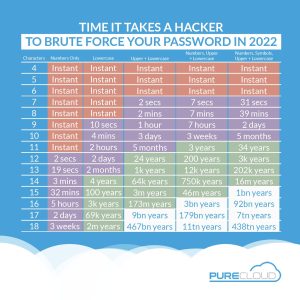Let’s face it: no one really enjoys changing their password. It’s one of those necessary evils, right? But trust us, it’s a lot more important than we like to admit. The reality is, 80% of cyber attacks are caused by weak or stolen passwords. And if you’re one of the many people who skip out on this simple step, you could be leaving yourself wide open to a potential disaster.
Why Should I Change My Password Every 90 Days?
It’s simple – regularly changing your password is one of the best ways to protect yourself from cybercriminals. When you change your password quarterly, you dramatically reduce your chances of having your accounts exposed or hacked. According to the experts, passwords are safest when they are 14 characters or longer and contain a mixture of numbers, symbols, and both uppercase and lowercase letters. Yet, surprisingly, 13% of people still use the same password for all of their accounts. That’s one serious risk!
Kaspersky’s Shocking Findings:
Kaspersky recently tested 193 million passwords found on the dark web, and the results are eye-opening. The study found that:
-
45% of passwords can be cracked within one minute.
-
59% can be cracked in under one hour.
-
73% are cracked within one month.
Even more alarming, passwords that are weak (like “password123” or “qwerty”) can be guessed in seconds by cybercriminals using brute force or advanced algorithms.

But What Makes a Password Strong?
To make your password as secure as possible, aim for at least 12 characters. And make sure it’s random, not based on dictionary words, personal names, or simple patterns. For example, avoid using words like your pet’s name or your favorite sports team (we know, your cat is cute, but hackers don’t care). Password managers can help generate complex passwords that are much harder for hackers to crack.
What’s the Worst That Can Happen?
Let’s get real. Many people use their passwords for important personal accounts – photos, documents, even tax information. Can you imagine what would happen if someone hacked into your accounts and deleted everything? It could be a nightmare.
Don’t let it happen to you. Use a strong, unique password for each account. And remember, don’t reuse passwords. If one gets compromised, having different ones for each account means the damage is limited.
Key Takeaways:
-
Change your password every 90 days to reduce your risk of cyber attacks.
-
Aim for 14+ characters with a mix of numbers, symbols, and both upper and lowercase letters.
-
Use a password manager to create complex passwords you don’t have to remember.
-
Avoid using personal names, dictionary words, or easy-to-guess combinations.
-
Check if your password is in a leaked database.
Take the time to secure your accounts. The price of a strong password? A few minutes of your time. The cost of a hacked account? Priceless memories, lost files, and a lot of stress.
Stay safe, change your passwords regularly, and protect what matters.


